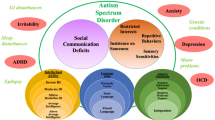Abstract
Clinical decision making is influenced by a range of factors and constitutes an inherently complex task. Here we present results from the decisions regarding ADHD management (DRAMa) study in which we undertook a thematic analysis of clinicians’ experiences and attitudes to assessment, diagnosis and treatment of ADHD. Fifty prescribing child psychiatrists and paediatricians from Belgium and the UK took part in semi-structured interviews about their decisions regarding the assessment, diagnosis and treatment of ADHD. Interviews were transcribed and processed using thematic analysis and the principles of grounded theory. Clinicians described the assessment and diagnostic process as inherently complicated and requiring time and experience to piece together the accounts of children made by multiple sources and through the use of varying information gathering techniques. Treatment decisions were viewed as a shared process between families, children, and the clinician. Published guidelines were viewed as vague, and few clinicians spoke about the use of symptom thresholds or specific impairment criteria. Furthermore, systematic or operationalised criteria to assess treatment outcomes were rarely used. Decision making in ADHD is regarded as a complicated, time consuming process which requires extensive use of clinical impression, and involves a partnership with parents. Clinicians want to separate biological from environmental causal factors to understand the level of impairment and the subsequent need for a diagnosis of ADHD. Clinical guidelines would benefit from revisions to take into account the real-world complexities of clinical decision making for ADHD.

Similar content being viewed by others
References
Banaschewski T, Becker K, Scherag S, Franke B, Coghill D (2010) Molecular genetics of attention-deficit/hyperactivity disorder: an overview. Eur Child Adolesc Psych 19(3):237–257
Biederman J, Faraone SV (2005) Attention-deficit hyperactivity disorder. Lancet 355(9841):237–248
Aebi M, Metzke CW, Steinhausen HC (2010) Accuracy of the DSM-Oriented Attention Problem Scale of the child behavior checklist in diagnosing attention-deficit hyperactivity disorder. J Atten Disord 13(5):454–463
Anney RJL, Lasky-Su J, O’Dushlaine C, Kenny E, Neale BM, Mulligan A et al (2008) Conduct disorder and ADHD: evaluation of conduct problems as a categorical and quantitative trait in the international multicentre ADHD genetics study. Am J Med Genet B 147B(8):1369–1378
Smalley SL, Loo SK, Yang MH, Cantor RM (2005) Toward localizing genes underlying cerebral asymmetry and mental health. Am J Med Genet 135:79 (Erratum 136B (1):107)
Danckaerts M, Sonuga-Barke EJS, Banaschewski T, Buitelaar J, Dopfner M, Hollis C et al (2010) The quality of life of children with attention deficit/hyperactivity disorder: a systematic review. Eur Child Adolesc Psych 19(2):83–105
Taylor E, Sonuga-Barke E (2008) Disorders of attention and activity. In: Rutter M, Bishop D, Pine D, Scott S, Stevenson JS, Taylor EA (eds) Rutter’s Child and Adolescent Psychiatry, 5th edn. Wiley-Blackwell, UK, pp 521–542
Pelham WE, Foster M, Robb JA (2007) The economic impact of attention-deficit/hyperactivity disorder in children and adolescents. J Pediatr Psychol 32:711–727
Hajjaj FM, Salek MS, Basra MKA, Finlay AY (2010) Non clinical influences on clinical decision making: a major challenge to evidence-based practice. J R Soc Med 103:178–187
Eisenberg JM (1979) Sociologic influences on decision making by clinicians. Ann Intern Med 90:957–964
McKinley JB, Potter DA, Feldman HA (1996) Non-medical influences on medical decision making. Soc Sci Med 42:769–776
Bernheim SM, Ross JS, Krumholz HM, Bradley EH (2008) Influences of patients’ socioeconomic status on clinical management decisions: a qualitative study. Ann Fam Med 6:53–59
Taylor E, Dopfner M, Sergeant J, Asherson P, Banaschewski T, Buitelaar J et al (2004) European clinical guidelines for hyperkinetic disorder—first upgrade. Eur Child Adolesc Psych 13:I7–I30
Banaschewski T, Coghill D, Santosh P, Zuddas A, Asherson P, Buitelaar J et al (2006) Long-acting medications for the hyperkinetic disorders—a systematic review and European treatment guideline. Eur Child Adolesc Psych 15(8):476–495
National Institute for Clinical Excellence (2008) Health NCCfM. Attention deficit hyperactivity disorder. Diagnosis and management of ADHD in children, young people, and adults (full NICE guideline)
Scottish Intercollegiate Guidelines Network (2009) Management of attention deficit and hyperkinetic disorders in children and young people. SIGN, Edinburgh
Cabana MD, Rand CS, Powe NR, Wu AW, Wilson MH, Abboud PAC et al (1999) Why don’t physicians follow clinical practice guidelines? A framework for improvement. J Am Med Assoc 282(15):1458–1465
Hart J, Salman H, Bergman M et al (1997) Do drug costs affect physicians’ prescription decisions? J Intern Med 241:415–420
Bhugra D, Easter A, Mallaris Y, Gupta S (2011) Clinical decision making in psychiatry by psychiatrists. Acta Psychiatr Scand 124:403–411
Crosskerry P (2003) The importance of cognitive errors in diagnosis and strategies to minimize them. Acad Med 78:775–780
Fossey E, Harvey C, McDermott F, Davidson L (2002) Understanding and evaluating qualitative research. Aust NZ J Psychiatry 36(6):717–732
Pope C, Mays N (1995) Qualitative research: reaching the parts other methods cannot reach: an introduction to qualitative methods in health and health services research. BMJ 311:42–45
Morse JM (2000) Determining sample size. Qual Health Res 10(1):3–5
Joffe H, Yardley L (2004) Content and thematic analysis. In: Marks DF, Yardley L (eds) Research methods for clinical health psychology. Sage, London, pp 55–68
Chamberlain K, Camic P, Yardley L (2004) Qualitative analysis of experience: grounded theory and case studies. In: Marks DF, Yardley L (eds) Research methods for clinical health psychology. Sage, London
Braun V, Clarke V (2006) Using thematic analysis in psychology. Qual Res Psychol 3:77–101.1
Rafalovich A (2005) Exploring clinician uncertainty in the diagnosis and treatment of attention deficit hyperactivity disorder. Sociol Health III 27(3):305–323
Grol R (2001) Successes and failures in the implementation of evidence-based guidelines for clinical practice. Med Care 39:II-46–II-54
Acknowledgments
We would like to thank all of the clinicians who participated in this study, as well as Helen Loader and Barbara Seiter for their administrative support. This study was funded by Shire Plc.
Author information
Authors and Affiliations
Corresponding author
Rights and permissions
About this article
Cite this article
Kovshoff, H., Williams, S., Vrijens, M. et al. The decisions regarding ADHD management (DRAMa) study: uncertainties and complexities in assessment, diagnosis and treatment, from the clinician’s point of view. Eur Child Adolesc Psychiatry 21, 87–99 (2012). https://doi.org/10.1007/s00787-011-0235-8
Received:
Accepted:
Published:
Issue Date:
DOI: https://doi.org/10.1007/s00787-011-0235-8




